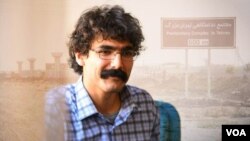The wife of a detained Iranian journalist from the nation’s Gonabadi Dervish religious minority says she is distressed by authorities’ persistent refusal to temporarily free her husband from a coronavirus-plagued prison.
In a Wednesday phone interview with VOA Persian from Tehran, Faezeh Abdipour said she had made repeated requests to Iranian officials to include her husband, Mohammad Sharifi Moghadam, in furloughs granted to tens of thousands of prisoners since late February.
Iran’s judiciary approved the prisoner furloughs in part to curb the spread of the virus in its crowded and unsanitary jails, where rights activists first reported outbreaks in early March. But authorities said the temporary releases would not be granted to dissidents with more than five-year prison sentences for engaging in activities designated as security offenses.
“We have been following up on (Moghadam’s) request for temporary release, have made numerous communications, and even referred his case to an implementation office and spoke with an official in charge of prisons, but all of our efforts failed,” Abdipour said.
Moghadam has been serving a 12-year sentence, upheld by an appeals court in March 2019, at the Greater Tehran Penitentiary on charges of “spreading propaganda against the government.” A lower court imposed the sentence in August 2018 after authorities detained him earlier that year while he covered street protests by other Gonabadi Dervishes in Tehran.
Abdipour said she suspects Iranian officials denied the furlough requests for her husband because his sentence exceeds five years. “Apparently, authorities think prisoners with more than five-year terms never get sick, so they don’t need to let these prisoners be released temporarily,” she said.
When such prisoners do get sick, as Abdipour previously said her husband did in 2018, the Great Tehran Penitentiary's healthcare system is so substandard that inmates cannot get effective treatment there, as she put it.
“The spread of this disease inside the prison, the infections of prisoners and the deaths of some of them are so distressing,” Abdipour said. “Health security is our top concern, and at any moment we expect to hear that our loved ones have become infected (with coronavirus),” she added, referring to herself and other relatives of detainees at the prison.
Iran has not provided any data on coronavirus infections in its prisons.
Moghadam was on assignment for the Majzooban-e-Noor news site, which focuses on Iran’s Gonabadi Dervish community, when security forces arrested him on February 19, 2018, as they cracked down on the Dervish protests that erupted in Tehran that day.
The protests of February 19-20, 2018, escalated into violent confrontations with security forces, who arrested more than 300 people. Five Iranian security personnel also were killed.
In August 2018, a Turkey-based editor of Majzooban-e-Noor told VOA Persian that Iranian authorities had sentenced six of the news outlet’s journalists to prison terms totaling 71 years after detaining them in connection with the protests. The news site said some of the journalists also had been beaten by plainclothes security agents while being arrested.
The Dervish protesters had been demanding the release of arrested members of their community and the removal of security checkpoints around the house of their elderly leader, Noor Ali Tabandeh. He later died in December 2019.
Members of the Sufi Muslim religious sect long have complained of harassment by Iran’s Shiite Islamist rulers, who view them as heretics.
Media rights group Reporters Without Borders (RSF) says Iran has been one of the world’s most repressive countries for journalists for the past 40 years. Iran ranked 173 out of 180 nations in RSF’s 2020 World Press Freedom Index.
This article originated in VOA’s Persian Service. Click here for the original Persian version of the story.




